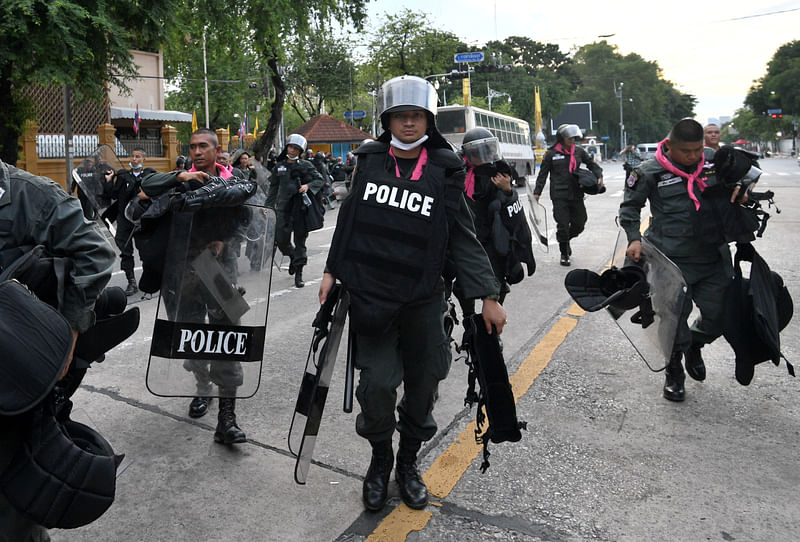
Thailand declares emergency, cracks down on protesters
Thailand issued an emergency decree banning gatherings of more than four people on Thursday as it launched a crackdown on escalating pro-democracy demonstrations that have also targeted the unassailable monarchy.
More than 20 people were arrested under the sweeping powers of the decree, which is aimed at halting months of student-led protests against the government of prime minister Prayut Chan-O-Cha, the former army chief who took power in a 2014 coup.
It comes a day after protesters challenged the royal motorcade, flashing the three-fingered salute adopted from "The Hunger Games" books and films, in an unprecedented act of defiance against the usually revered monarchy.
After the emergency measures were announced early on Thursday, police in riot gear moved in to disperse hundreds of diehard protestors who had camped out overnight outside the prime minister's office.
Student leader Parit Chiwarak, better known as "Penguin", was among more than 20 people arrested, according to Panusaya Sithijirawattanakul, another prominent activist.
A Facebook Live stream later showed Panusaya being bundled into a car by police as her supporters shouted "Long live the people!" and raised the "Hunger Games" salute.
The emergency measures limit gatherings to four people and allow the seizure of "electronic communications equipment, data, and weapons suspected to cause the emergency situation", a government spokesman said.
"These are orders banning gatherings of five or more people... and banning distributing of news through electronic media that can affect national security," the spokesman said in a statement.
The order was imposed after thousands of demonstrators rallied around Bangkok's Democracy Monument on Wednesday, ahead of a scheduled drive-by of the royal motorcade carrying King Maha Vajiralongkorn and his family.
While police cordoned most of the protesters away from the royal route, dozens were still present as the motorcade passed and Queen Suthida could be seen staring from a limousine window as protesters flashed the three-fingered salute.
Turbulent history
Such overt challenges to the monarchy are unheard-of in Thailand, where the royal family's influence permeates every aspect of society.
Those calls have prompted a backlash from Thailand's staunchly pro-royalist establishment.
The King is the most powerful figure in Thailand and is supported by the kingdom's powerful military and billionaire clans.
He spends much of his time in Europe, but he and his family have been in Thailand in recent days for an annual Buddhist ceremony.
Wednesday's drive-by was the first close encounter the royal family has had with the protesters. The day before, protesters had flashed the salute from a distance as the royal motorcade drove by.
Several popular anti-government movements have arisen in the turbulent modern history of Thailand, which has endured long bouts of political unrest and more than a dozen successful military coups since 1932.
The army has long positioned itself as the sole defender of the ultra-wealthy king, whose power stretches across every facet of Thai society.
Activists have repeatedly said they wish only for the monarchy to adapt to modern times.
Their demands include the abolition of a strict royal defamation law -- which shields the king from criticism -- and for the monarch to stay out of politics.
Since the protests started, dozens of activists have been arrested, charged with sedition and released on bail.
Government spokesman Anucha Burapachaisri said the premier had ordered police to press charges against "the protesters who obstructed the royal motorcade" on Wednesday.
Charges will also be pursued against "those who had acted in a way that defames the monarchy", he said in a statement.
"They must face legal procedures without exception."
After protesters marched to the Government House on Wednesday, they stayed through the night shouting for Prayut to "get out", while some camped outside.
The demonstration was intended to commemorate the 47th anniversary of a 1973 student uprising that saw 77 people killed.